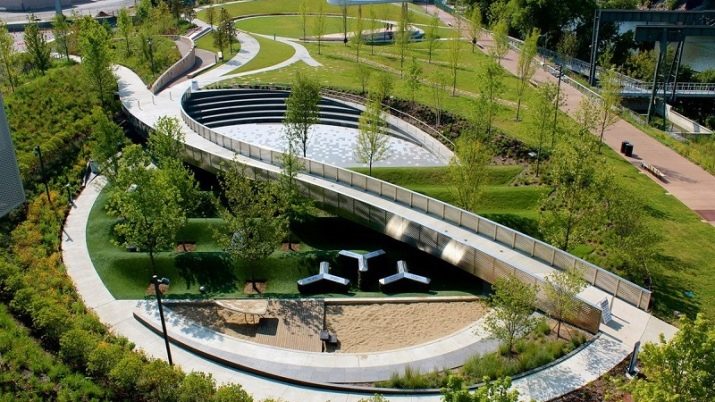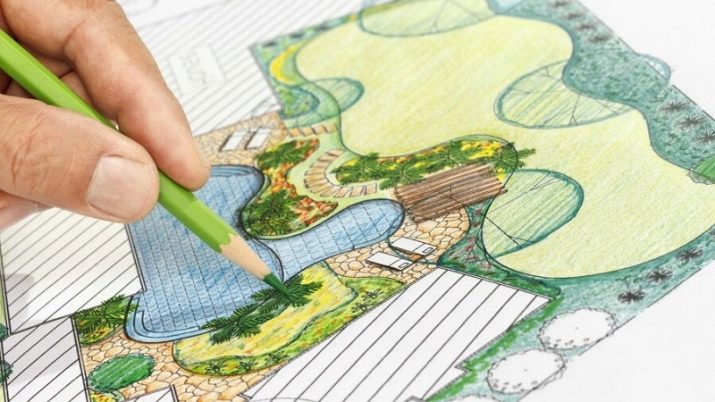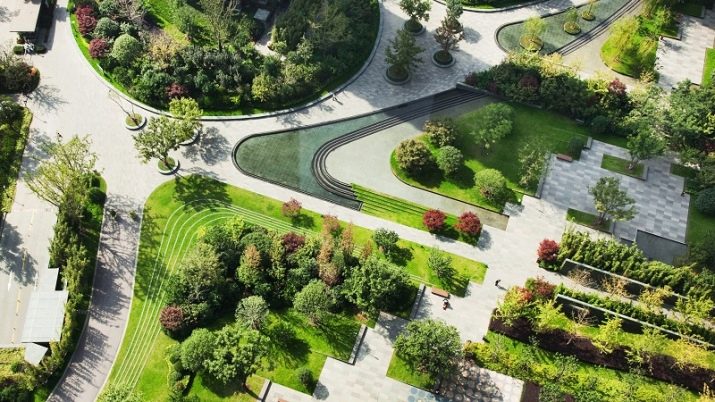Landscape architect - a specialist engaged in the organization and arrangement of open free space in the territory of which construction objects and green spaces are located or are planned for placement. This type of activity requires a person to have developed creative and analytical abilities. What are the features of such work that a landscape architect should know and be able to, how much the representatives of this profession earn - we will talk about this in our article.

Profession Features
Landscape architecture is both exact science and art. When working on the spatial and spatial arrangement of the territory, the specialist should not only proceed from the current features of the terrain (relief, shape and area of the plot, available plantings and objects), but also clearly imagine the ways and possibilities of its transformation.
The main task of a landscape architect is to organize an attractive (from an aesthetic point of view), safe and comfortable environment, combining natural and artificially created objects. For this specialist:
- carefully studies the territory and its features;
- develops a plan for the arrangement of the territory;
- marks out on the plan functional zones, locations of already existing objects (plantations) and places where it is supposed to place new objects (plantations);
- develops layout of communications on the site.
The specialist brings all possible landscape transformations to the plan, based on the characteristics of the territory: its relief, slope, type and density of soil, groundwater level and other characteristics.
The end result of his work is a competently designed and organized space in which natural, construction, engineering and architectural components are organically combined.

Landscape architect - a specialist in demand in industries such as:
- urban planning, urban gardening and landscaping;
- gardening and improvement of private household territories;
- restoration of architectural objects;
- optimization of the urban environment;
- nature conservation and nature management;
- scientific and teaching activities;
- consulting services in the field of architecture.
The described field of activity is in close contact with a number of disciplines in which the landscape architect is required to professionally understand. Such disciplines, in particular, include biology, crop production, industrial design, ecology, architecture. Among the advantages of this profession, experts themselves note multitasking, unpredictability, originality. It requires from a person not only original creative, but also rationalized, logically sound decisions. At the same time, it provides unlimited scope for self-expression and self-realization.
Landscape architecture is a field of activity associated with impressive intellectual stress, stress and a high level of responsibility. To succeed in this area, a specialist must possess not only impeccable professional knowledge and skills, but also such personal qualities as stress resistance, self-organization, and the ability to think outside the box.

What is the difference from a landscape designer?
Despite the fact that the directions of the landscape architect and landscape designer are in close contact with each other, the tasks facing these specialists are fundamentally different. A landscape architect makes more global and ambitious decisions related not only to the decoration of the space, but also to its technical arrangement and equipment. This profession is associated with a wider range of responsibilities and a high degree of responsibility.
The landscape designer, in most cases, performs work related only to landscaping and landscaping. Its main task is to create an aesthetically attractive and comfortable space combining buildings, green spaces, small architectural forms, large and small decorative elements.
In addition, unlike the landscape architect, the designer uses a less extensive list of tools, techniques and methods of decorating the territory in his work.

Responsibilities
The scope and list of responsibilities that a landscape architect must fulfill is determined in each case by the management of the company. The range of main tasks facing a specialist in this profile usually includes:
- pre-design work (collection and analysis of information necessary for project development, landscape analysis of the territory, preparation of design and reporting documentation);
- development of landscape-planning decisions in relation to certain parts of the project in accordance with the terms of reference;
- making economic calculations justifying the rationality of the proposed design solutions;
- development and coordination of design solutions with senior management;
- control over the implementation of adopted and approved design decisions.
In addition, the official professional standard provides participation of a landscape architect in surveying and pre-design research. At this stage, the specialist is engaged in a comprehensive study of natural conditions in the area (object) entrusted to him.
In the future, the landscape architect uses the results of this work to carry out feasibility studies, develop drawings and layouts of utilities.

Requirements
The high level of responsibility with which the work of a landscape architect is associated requires from the specialist not only impeccable professional knowledge, but also certain personal qualities. To the list of required knowledge and skills that a representative of the described profession should possess, it is customary to include the following:
- knowledge of the basics of designing landscape objects;
- knowledge of the fundamentals of engineering and construction preparation of the site;
- knowledge of natural (biological) aspects of landscape architecture;
- mastery of drawing technique;
- Proficiency in specialized computer programs and graphic editors.
In addition, the landscape architect must be well versed in such specific disciplines as geology, geohydrology, soil science, dendrology, material science. Without fail, a specialist of this profile should be familiar with the basics of construction, the basics of organization, arrangement and placement of underground and above-ground engineering communications.
Considering that this field of activity is inextricably linked with impressive intellectual workloads, a high level of responsibility and a large number of diverse tasks, special importance is attached to such personal qualities of a specialist as:
- self-discipline;
- sociability;
- artistic taste;
- developed spatial thinking;
- self-criticism;
- teamwork skills.
Another important quality a landscape architect should have experts consider customer focus. This implies the ability to find a common language with the customer, to understand the essence of his requirements and wishes.

Education
You can get the profession of landscape architect on the basis of secondary education (9 or 11 classes). In Russia, there are more than 100 educational institutions offering training in this specialty. These include such well-known universities as RUDN University (Moscow), Leningrad State University. Pushkina (St. Petersburg), GUZ (Moscow).
Applicants with secondary education, when entering a university or professional college will need to pass exams in the following subjects:
- Russian language;
- mathematics;
- geography (physics or biology).
Given that the profession of a landscape architect is closer to the exact sciences, rather than to art, applicants usually enter don't have to take creative exams. Duration of study at the college is 2.5-3.5 years, at the university - 4-5 years. The proposed forms of training in most colleges and universities are full-time and evening.
Persons with secondary specialized or higher non-core education, as well as persons receiving higher non-core education, in some educational institutions Professional retraining courses are offered under the Landscape Architecture program. Retraining courses are carried out on a paid basis. To register for training, the student does not need to take exams in any subjects. At the end of the retraining courses, students are issued a certificate or diploma of a state standard.
It is noteworthy that a number of universities provide the opportunity to study remotely, without interrupting work or basic training.

The salary
The profession of landscape architect is not only very much in demand, but also well paid. So, the average salary of a specialist of this profile in Moscow varies between 50-75 thousand rubles, in St. Petersburg - within 35-45 thousand rubles. The average salary of a landscape architect in the regions of the Russian Federation is 20-30 thousand rubles.
Representatives of the described field of activity receive the highest salaries in the USA, Australia and Canada.The average salary of a landscape architect in these countries is about 70-110 thousand dollars a year.
Prospects and Careers
Career growth of a specialist in landscape architecture, depends not only on his professional, but also on personal qualities. Diligence, a sense of responsibility, talent and personal ambitions, coupled with impeccable professional knowledge and skills, are able to open up a lot of opportunities for a career ladder to a specialist in this field.
So, starting from a modest intern position at a design bureau or design studio and gaining the necessary experience, a specialist can eventually take the place of the chief landscape architect. In large companies, an assistant landscape architect (junior specialist), relentlessly demonstrating impeccable work results, is able in several years to get the post of head or deputy head of the project department.
Many successful landscape architects eventually go into the field of individual entrepreneurship. Working in this direction, you can open your own design studio, a small architectural design bureau or consulting agency. Besides, landscape architect can build his career in research and teaching.
It is now possible to get a position of a scientific employee or teacher of this discipline both in a commercial and in a state educational institution.









